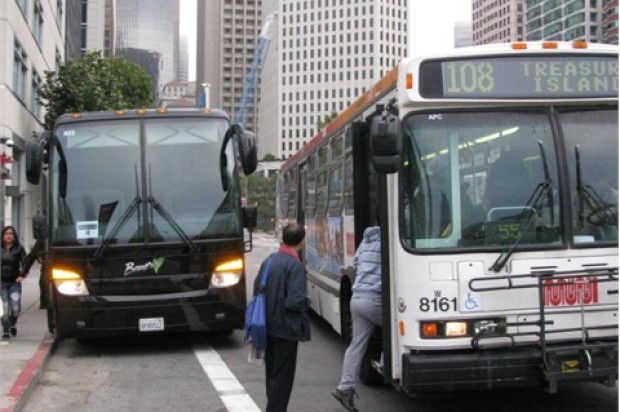
The fate of an 18-month pilot program that would charge private commuter buses $1 each time employees are picked up or dropped off at public bus stops in San Francisco will be determined at a San Francisco Board of Supervisors hearing Tuesday.
Members from the city’s Service Employees International Union Local 1021 and other community groups have appealed the San Francisco Municipal Transportation Agency’s board of directors 5-0 approval of the program on Jan. 21.
The program is designed to alleviate the ongoing issue of private shuttles using Muni stops to load and unload passengers, according to SFMTA officials.
Companies such as Google and Facebook that shuttle their employees to work and back will be charged $1 per stop to use designated Muni stops. The fee will also apply to other private shuttle buses, including hospitals and universities.
The program is expected to cost the agency $1.6 million, which would be recovered through the shuttle fees.
According to SFMTA, more than 35,000 private shuttle boardings occur each day in San Francisco. The agency will allow shuttle buses at about 200 selected bus stop locations.
The appeal of the program will be brought to the supervisors at their 2 p.m. meeting for a hearing.
Opponents have called on the board of supervisors to appeal the SFMTA board’s decision because the city’s Planning Department approved the pilot program’s exemption from a state environmental review as part of the California Environmental Quality Act.
If the supervisors approve the appeal, the program would have to be re-evaluated to determine what type of additional CEQA process is needed, according to SFMTA spokesman Paul Rose.
“We’re confident that the CEQA clearance is appropriate and will be upheld,” he said.
The group is asking that an environmental assessment take place before the program takes effect, which would push back the July 1 start date.
In a Feb. 19 letter, the appellants’ attorney Richard Drury wrote that the commuter shuttle project “is likely to displace numerous residents and commuters who currently live, work, commute, and recreate in the areas proposed…and replace them with workers from the private technical companies sponsoring the shuttles, who are wealthier and less likely to come from communities of color.”
The opponents consider the shuttle program to be “discriminatory.”
Rose said opponents claim SFMTA is not enforcing regulations at public bus stops, however he said a comprehensive policy is not yet is place.
Rose said going forward with the pilot program will allow the agency to implement clear-cut rules that can be enforced for how shuttle buses are supposed to use and pay for bus stops.
In an SFMTA response to the appeal, agency staff wrote that the pilot program “will enable SFMTA to evaluate whether sharing Muni stops specifically selected to minimize impacts on Muni and other users, permit terms that establish standards for operations, and data-supported system management can minimize conflicts while supporting the beneficial commuter options that shuttles provide.”
SFMTA officials asked the board to deny the appeal, claiming “the decision to uphold the appeal will only serve to continue the current circumstances.”
According to SFMTA staff, shuttles are currently blocking Muni areas, causing traffic problems, slowing down bus schedules and leading to other congestion issues.
The board’s hearing comes after the Bay Area Council released a survey of city voters’ opinions on commuter shuttles last week.
Based on the poll of 500 residents, 28 percent did not support the shuttle buses, while 57 percent felt favorably about the buses.
About two-thirds of respondents supported the Muni pilot program.
The polls were conducted by the Oakland-based EMC Research on behalf of the Bay Area Council, a Bay Area business advocacy group.
Sasha Lekach, Bay City News









